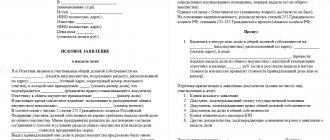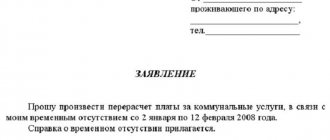Procedure for using an apartment in shared ownership
An apartment owned by two or more persons with the definition of the share of each of them belongs to them on the right of common shared ownership (clauses 1, 2, Article 244 of the Civil Code of the Russian Federation).
Possession and use of such an apartment is carried out by agreement of all owners, and if agreement is not reached, in the manner established by the court (clause 1, article 247 of the Civil Code of the Russian Federation).
A participant in shared ownership has the right to be provided for his possession and use of a part of the common property commensurate with his share, and if this is not possible, he has the right to demand from other participants who own and use the property falling on his share, appropriate compensation (clause 2, article 247 Civil Code of the Russian Federation).
Determining the procedure for using the apartment
Any of the participants in shared ownership has the right to file a lawsuit to determine the procedure for using the apartment if the co-owners could not reach an agreement among themselves (Article 247 of the Civil Code of the Russian Federation; Part 1, Article 3 of the Civil Procedure Code of the Russian Federation).
In addition, you can go to court with a request to determine the procedure for use if it is impossible to divide the apartment or allocate a share in kind from it (clause 37, Resolution of the Plenum of the Supreme Court of the Russian Federation No. 6, Plenum of the Supreme Arbitration Court of the Russian Federation No. 8 of 07/01/1996).
The statement of claim is submitted to the district court at the location of the apartment
(Article 24, Part 1, Article 30 of the Code of Civil Procedure of the Russian Federation).
When resolving the requirement to determine the procedure for use, the court takes into account (clause 37, Resolution of the Plenum of the Supreme Court of the Russian Federation No. 6; Plenum of the Supreme Arbitration Court of the Russian Federation No. 8; Appeal ruling of the Moscow City Court dated 03/04/2020 in case No. 33-9973/2020):
• the actual procedure for using the apartment, which may not exactly correspond to the shares in the common property right; • the need of each of the co-owners in this apartment; • real possibility of sharing.
In some cases, the court refuses to satisfy the stated requirements. This is possible, for example, if the procedure for using the apartment between the co-owners has not worked out, the plaintiff does not live in the disputed apartment, the size of the living rooms is disproportionate to the shares belonging to the parties to the dispute, and the determination of the procedure for use will lead to a significant infringement of the rights and legitimate interests of other owners (Appeal Determination of the Moscow City court dated January 20, 2020 in case No. 33-2252/2020).
If it is not possible to provide a participant in shared ownership for living with a part of the apartment commensurate with his share, then he may demand that the other owners of the apartment pay appropriate monetary compensation.
Depending on the circumstances of the case, a demand may also be made to remove obstacles to the use of residential premises (clause 2, article 247 of the Civil Code of the Russian Federation; Determination of the Judicial Collegium for Civil Cases of the Supreme Court of the Russian Federation dated November 13, 2018 N 18-КГ18-186; Appeal determination Moscow City Court dated November 26, 2019 in case No. 33-52977/2019).
Two orders of ownership and use can be established. The first presupposes the consent of all participants in the common property, but those moments when there is unanimity regarding the exercise by co-owners of their rights to the common property are not of interest. The provisions of the law acquire practical significance in cases where the opinions of participants about the procedure and methods of using common property differ, and a dispute arises between them. Then the order of possession and use is determined by the court upon the claim of any of the participants. The law does not contain direct instructions on what rules the court should follow when resolving such cases. These rules were formulated in paragraph 37 of the joint resolution of the Plenum of the Supreme Court of the Russian Federation and the Supreme Arbitration Court of the Russian Federation dated July 1, 1996 No. 6/8 “On some issues related to the application of part one of the Civil Code of the Russian Federation,” the importance of which is difficult to overestimate. According to this paragraph, the impossibility of dividing property in shared ownership in kind or separating a share from it does not exclude the right of a participant in common shared ownership to make a demand to determine the procedure for using this property, if this procedure is not established by agreement of the parties. When resolving such a requirement, the court takes into account the actual established procedure for using the property, which may not exactly correspond to the shares in the right of common ownership, the need of each of the co-owners for this property and the real possibility of joint use1. To confirm the words, let's look at one example of judicial practice. The Kalininsky District Court of Chelyabinsk, when considering civil case No. 2-2640/2012, satisfied the plaintiff’s claims.
From the case materials it follows that the plaintiff P.V.V., acting in her own interests and the interests of the minor P.E.S., turned to P.S.V. with a claim to eliminate obstacles in the use of residential premises and moving into an apartment, determining the procedure for using this residential premises by transferring an isolated room with an area of 11.2 sq.m., and for the use of the defendant - a room with an area of 18.9 sq.m. Minor P.E.S. is the owner of 1/3 share in the ownership of the apartment. Currently, the second co-owner P.S.V., who is the father of P.E.S., lives in the said apartment. Until May 2010, they lived as one family in the disputed apartment, but family life did not work out, and the plaintiff and his daughter were forced to move. This apartment consists of four rooms in which, in addition to the plaintiff and his daughter, five more people live and are registered. The plaintiff, together with her daughter and grandmother, occupy the smallest room with an area of 10 sq.m. in the specified residential area. Due to the existing conflictual relationships with other relatives, living together with them in the same apartment is impossible, since the conflicts that arise have a negative impact on the child and do not allow the daughter to fully study and do homework, organize her rest and leisure time.
These conditions are unacceptable for a child to live in, and therefore attempts have been made repeatedly to move into the disputed apartment with his daughter. However, the defendant prevents her from doing this; no agreement has been reached between them on the procedure for using the apartment. After studying the case materials and listening to all participants in the process, the court came to the conclusion that it was possible to satisfy the plaintiff’s claims. By virtue of Part 1 of Article 40 of the Constitution of the Russian Federation, everyone has the right to housing. No one can be arbitrarily deprived of their home. In accordance with paragraph 1 of Article 209 of the Civil Code of the Russian Federation, the owner has the rights to own, use and dispose of his property. According to paragraphs 1, 2 of Article 288 of the Civil Code of the Russian Federation, the owner exercises the rights of ownership, use and disposal of residential premises belonging to him in accordance with its purpose. Residential premises are intended for the residence of citizens. A citizen owner of a residential premises can use it for personal residence and residence of his family members. The norm of Article 304 of the Civil Code of the Russian Federation provides that the owner may demand the elimination of any violations of his rights, even if these violations were not associated with deprivation of possession. According to Articles 56, 64 of the Family Code of the Russian Federation, a child has the right to protection of his rights and legitimate interests, which is carried out by his parents. The child also has the right to protection from abuse by parents. Plaintiff P.V.V. and her minor daughter P.E.S. were deprived of the opportunity to independently enter the disputed apartment due to their lack of keys to the front door. Free access to the disputed residential premises is limited due to the termination of family relations with the defendant. The above actions of the defendant violated the rights of P.E.S. as the owner of the possession, use and disposal of the property belonging to her. Paragraph 2 of Article 20 of the Civil Code of the Russian Federation provides that the place of residence of minors under fourteen years of age or citizens under guardianship is recognized as the place of residence of their legal representatives - parents, adoptive parents, guardians. Availability of P.V.V. on the right of ownership of another residential premises, namely 1/6 of the share in the ownership of the apartment, in itself cannot be a basis for refusing to satisfy the requirements of P.V.V. about moving into the disputed residential premises, since, as stated above, living together with a child in an apartment causes a negative attitude of other close relatives towards them. Under such circumstances, the plaintiff and her minor daughter are interested in using the disputed apartment for its intended purpose and intend to live in it.
Articles 246-247 of the Civil Code of the Russian Federation provide that the ownership and use of property in shared ownership is carried out by agreement of all its participants, and if agreement is not reached, in the manner established by the court. A participant in shared ownership has the right to be given for his possession and use a part of the common property commensurate with his share, and if this is not possible, he has the right to demand from other participants who own and use the property falling on his share, appropriate compensation. Thus, the court, satisfying the claims, determined the procedure for using the apartment, allocating for use P.V.V. and P.E.S. isolated room with an area of 11.20 sq.m., for the use of P.S.V. room with an area of 18.90 sq.m. Common areas - kitchen, toilet, bathroom, corridor and closets - are designated for joint use by the owners. The need to determine the procedure for using residential premises arises, as a rule, due to hostile relations that have arisen between family members (former family members) of the owner and tenant. The conflict leads to the creation of obstacles to one of the family members (former family members) in the use of housing, which is expressed, first of all, in changing door locks, putting things out, creating other obstacles, even causing harm to the health of a family member when the latter tries to enter into a disputed living space.
The owner has the right, at his own discretion, to take any actions in relation to his property that do not contradict the law and other legal acts and do not violate the rights and legally protected interests of other persons, including alienating his property into the ownership of other persons, transferring to them, while remaining the owner, the rights possession, use and disposal of property, pledge property and encumber it in other ways, dispose of it in any other way. The above-mentioned resolution made it possible for owners of residential premises to raise the issue of the procedure for using residential premises before the courts if the co-owners cannot resolve this issue voluntarily. In resolving such a requirement, the court takes into account the actual procedure for using the property, which may not exactly correspond to the shares in the right of common ownership, the need of each of the co-owners for this property and the real possibility of joint use. The reasons for refusal to satisfy claims to determine the procedure for using residential premises can be classified into the following main groups: Inconsistency between the requirements for the area of the room (rooms) and the size of the owner’s share. The plaintiff does not need housing. Inability to use residential premises together with other co-owners. Other reasons. If the transfer of the specified share of property to this owner is in reality impossible, then the owner of the share has the right to demand that other owners who actually own and use the corresponding share of property pay him monetary compensation.
Below is another positive example of established judicial practice in this category of cases. By the decision of the Ust-Ilimsk City Court of the Irkutsk Region in case No. 2-3012/2012, the claims were satisfied in terms of determining the procedure for using the apartment, in terms of recognizing the defendant S.V.N. Those who terminated the right to use the apartment and were denied deregistration. In support of the claims of O.O.V. indicated that she is the owner (...) of a share in the right of common shared ownership of a three-room apartment. The co-owner of the other (...) share in the disputed apartment is her mother O.G.N., who moved in and registered the defendant S.V.N. in the disputed apartment, who does not participate in the maintenance of the apartment and payment for services, voluntarily deregistered doesn't want to. The defendants prevent her from living in the apartment as the owner. She asked to determine the procedure for using the disputed residential apartment, assigning for her use a room with an area of (...) sq.m., O.G.N. - rooms with an area of (...) sq.m and (...) sq.m; recognize S.V.N. who have terminated the right to use the residential premises by deregistering them at the specified address. Defendants O.G.N. and S.V.N. do not agree with the claims. The procedure for using the disputed residential premises proposed by the plaintiff was considered unacceptable in this case, because registered and living in the apartment is G., who is disabled and declared incompetent by a court decision, whose guardian O.G.N. is appointed, and S.V.N., a participant in the liquidation of the Chernobyl accident, and the son of the defendant O.G. are also registered and living .N. - E., disabled, in connection with which the procedure for using the disputed residential apartment must be determined taking into account the rest of the family members. The defendants do not interfere with the plaintiff’s residence and use of the residential premises. Defendant S.V.N. was moved into the disputed apartment with the consent of the other owners, is a member of O.G.N.’s family, is registered in the disputed apartment, uses and lives in the apartment on an equal basis with the owner, and bears the costs of its maintenance.
By virtue of Part 1 of Article 30 of the Housing Code of the Russian Federation, the owner of a residential premises exercises the rights of ownership, use and disposal of residential premises owned by him in accordance with its purpose and the limits of its use, which are established by this code. In accordance with paragraph 2 of Article 244 of the Civil Code of the Russian Federation, property can be in common ownership with the determination of the share of each owner in the right of ownership (shared ownership) or without determination of such shares (joint ownership). Issues of joint ownership and use are regulated by Articles 247 and 252 of the Civil Code of the Russian Federation. According to Article 247 of the Civil Code of the Russian Federation, ownership and use of property in shared ownership is carried out by agreement of all its participants, and if agreement is not reached, in the manner established by the court. A participant in shared ownership has the right to be given for his possession and use a part of the common property commensurate with his share, and if this is not possible, he has the right to demand from other participants who own and use the property falling on his share, appropriate compensation. The occupancy by the owner of a residential premises of his family members and other citizens is the exercise by him of the right to use and dispose of the residential premises belonging to him. Part 3 of Article 17 of the Constitution of the Russian Federation establishes that rights and freedoms, and therefore the right to property, must be exercised in such a way as not to violate the rights and freedoms of other persons. The introduction of restrictions for the owner is permitted by Article 56 of the Constitution of the Russian Federation.
In these rules of law, the legislator enshrines the general principle of limiting the discretion of the copyright holder in the exercise of his civil rights - the prohibition of abuse of rights. When resolving the requirement to determine the order of use, it is necessary to take into account the established order of use of the property, which may not exactly correspond to the shares in the right of common ownership, the need of each of the owners for this property and the real possibility of joint use. Despite the fact that the procedure for using the disputed residential premises had already been established between the co-owners, each of them was assigned a specific living room for use, but the established procedure did not correspond to the size of the share of each of the co-owners in the specified property. The plaintiff’s proposed procedure for using a residential apartment by recognizing the plaintiff’s right to use an isolated room (...) sq.m. did not violate any rights and legitimate interests of the other co-owner O.G.N., since O.G.N. the right to use rooms (...) sq.m and (...) sq.m is recognized, which will be (...) sq.m, this excess is insignificant. Family members of the owner of residential premises include his spouse living together with this owner in the residential premises belonging to him, as well as the children and parents of this owner. Other relatives, disabled dependents and, in exceptional cases, other citizens may be recognized as members of the owner’s family if they are settled by the owner as members of his family. Since from the explanations of the parties it was established that G. and S.V.N. were installed by the defendant O.G.N. as members of her family, with the consent of the plaintiff O.O.V., the indicated persons are members of the O.O.V. family. are not, therefore, co-owner of the residential premises O.G.N. has the right to provide them with residential premises for use for living, designated for the use of a co-owner.
Every citizen of our country has housing rights, but citizens do not always understand how exactly they need to protect their interests and defend their rights without violating the interests and rights of other people. Conflicts due to lack of understanding, specific knowledge and experience constantly arise between former spouses, relatives or neighbors. The law allows the owners of residential premises to enter into an agreement to determine the procedure for using the residential premises, and if such an agreement is unattainable, go to court to establish the procedure for using the residential premises. Claims to determine the procedure for using residential premises are in most cases satisfied by the courts. However, in some cases, courts decide to reject such claims. Relations of common property are complexly structured relationships in which not only material components are intertwined, but also emotional and psychological, which is especially obvious when the common thing is a living space. The important point is that, on the one hand, the co-owners use a common thing for a long period of time, live in a “common house” and, of course, acquire common rules of behavior that make such living possible. On the other hand, each of the co-owners is not deprived of the opportunity to sell their share and thereby let a new member into the established world, which can destroy the stability of relationships and the comfort of living. Thus, the actually established procedure for use is the rules for the use of common property established by the parties or the court, existing for a long time and not always corresponding to the shares in the right of common property, extending to persons who joined the common property relationship after their occurrence, subject to mandatory consideration when making a judicial decision. solutions. Filatova U.B. “On the judicial practice of resolving disputes related to the determination by citizens of the procedure for using common residential premises” - 2011.
Sorokina Yulia Evgenievna.
Published in the magazine “Housing Law”, 2015, No. 1.











